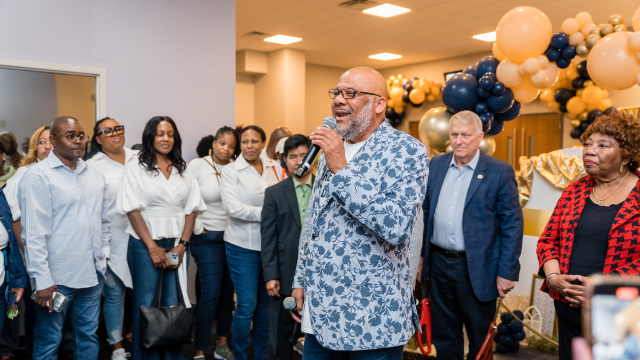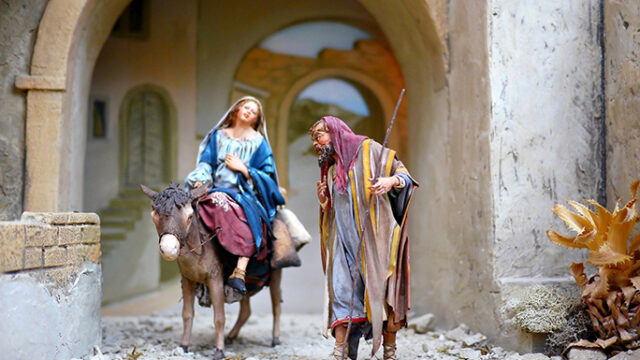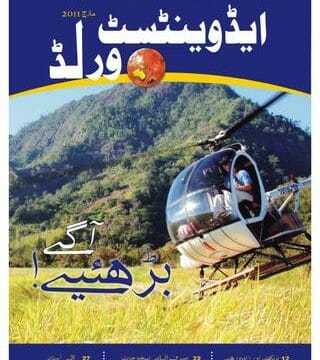Event draws Deaf and Adventist leaders for reflection, training, and inspiration.

Under the theme, “All in Mission,” the Adventist Church’s East Venezuela Union Mission (EVAU) held its first conference for the Deaf in the regional headquarters’ auditorium in Caracas, August 31.
More than 120 people attended the event hosted by Rocío de Chacón, director of the EVAU possibility ministries. Among them were 75 members of the deaf and hearing-impaired community, Venezuelan Sign Language interpreters, and delegates from the local fields and Venezuela Adventist University Institute (IUAV), who gathered with four main goals in mind, de Chacón said.
“This conference is focused on two areas: serving members of the Deaf and the hearing-impaired community, and our leaders serving in Adventist Ministries to the Deaf,” de Chacón explained. “At the same time, we sought to open a space for our deaf brothers and sisters to meet, interact, and praise together,” she added. “Finally, our goal is to strengthen their faith and belief in the Adventist faith.”
Similarly, de Chacón shared that organizers want to train the leaders of the Adventist ministry to the deaf, so they are better acquainted with the hearing-impaired culture in a church setting. “It is extremely important to handle this to act in a respectful way,” she said, “and we want to also provide basic and practical strategies that they can take to their churches and use in their communities.”
Speakers at the event presented on topics such as “The Devotional Life of the Believer,” “Reverence,” “Organizational Structure of the Church,” and “Gifts and Talents.” They also presented on “Lies and Biblical Truths,” “Human Relations,” “Deaf Culture,” and “Images behind the Message.” In addition, participants enjoyed a mini concert performed by a choir of deaf persons and “Hands of Praise” performers.
Also, during the program, broadcast on the EVAU YouTube channel, participants witnessed the baptism of a member of the Deaf community, while other members received certificates of completed Bible studies. Likewise, leaders honored several people for their outstanding evangelistic contribution on behalf of deaf people.
There are approximately 108,000 deaf people in Venezuela, which amounts to 0.4 percent of the total population, according to the latest 2011 National Census of the National Institute of Statistics (INE).
The EVAU has only one bicultural church exclusively for deaf persons located in the city of Caracas. Unfortunately, there are no statistics on how many deaf members are currently in the union territory.
Jonathan Marcano, a pastor who attended the event as a delegate, emphasized that in the context of the need to reach the deaf, the training provided is key. “Knowing that something is being done to train us and get us involved in this mission is exciting and fills me with joy,” he said. “Reaching this community involves a lot of effort on our part; we are the ones who have to prepare ourselves, learn how to communicate in their language, learn about their communication system, to extend to them a clear message that might reach their hearts.”
Marcano also called on other Adventist members to join him and others in this effort. “I invite you to acquire the knowledge, the capacities, and skills,” he said. “God calls, God empowers, so that every day there might be fewer people ignored and excluded, not knowing about the beautiful message that we must preach to every tongue, tribe, and nation.”
On the same note, Silvia Goncalvez, advisor to the EVAU possibility ministries and Venezuelan Sign Language interpreter, said she felt happy to participate in the event. “I consider it an honor, the fact that God has chosen us to take the message of the gospel to the hearing impaired,” Goncalvez said. “An event such as this helps them to understand that the Seventh-day Adventist Church is a church of inclusion and accessibility, just as Jesus was close, while He was on this earth, to people with disabilities.”
One of Goncalvez’s important tasks is training deaf individuals so they are ready to join the labor force. She works hard to open employment opportunities to people who would normally be rejected because of their condition. “It’s a sort of ant job [painstaking task],” she said as her eyes sparkled with excitement.
Pastor and psychologist Daniel Fonseca, together with his wife, a lawyer and member of the Sinaí Gutiérrez deaf community and serving at the Adventist university, said that their experience at the event “was unforgettable, because we never imagined seeing such a large community of deaf people and leaders committed to their individual spiritual formation.”
Similarly, the Fonsecas emphasized that the university serves all students with special needs. One of these ways of showing support, they said, is the Mephibosheth Project, where students from different programs at IUAV receive instruction in Venezuelan Sign Language. Around 15 students are currently involved in the project.
Although initiatives to serve the hearing impaired started in the region more than 10 years ago, it is the first time that there has been such a solid movement in the EVAU territory, event organizers said.
At the end of the event, leaders of possibility ministries committed to providing more training so that more people and local churches can approach the Deaf throughout the country with God’s message. Regional leaders will meet before the end of the year.
A second conference is being planned for 2025.
The original version of this story was posted on the Inter-American Division news site.













